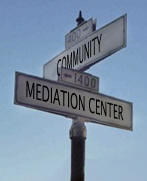
 news
from the
news
from the
front
This
month, I'm writing at length to describe one of our many services: divorce
and post-divorce mediation.
Because there are now so many options when it
comes to divorce mediation----not to mention many mediators to choose from---it
is important for folks to understand what service CMC provides in this regard.
First, two small digressions which will help put our service in context:
1. Community mediation, by definition, is a dispute resolution taken on by
community members, for community members. Historically, it took place outside
the ambit of the courts. The courts used the rule of law, while mediation used
the will of the disputants to compromise and settle their differences in a way
that suited them. Rule 31 was instituted and thus has developed a professional
class of mediators who charge for their services and have taken approved
training and credentials.
2.
As many of you know, one of CMC's initial missions---taken on when CMC was still KBAMS---Knoxville Bar Association Mediation Service---back in the early
1990s, before Rule 31 was a fact---was divorce mediation. Our clients were and are couples who needed
free or very low-cost services in order to divorce, or who needed to develop a
post-divorce parenting plan or modification to an existing plan that no longer
worked.
Before there was a Rule 31 (oh yes,
back when the word "mediation" was not often heard within the halls of
justice...unless it was federal court, but that's another bedtime story...),
citizens of Knoxville could mediate if they could find mediators trained to deal
with parenting issues. Anyone could be a mediator (That's still true, so
consumers need to ask about mediator training and experience.) That's where KBAMS came in. KBAMS initially
trained a small group of local attorneys and other professionals to co-mediate
divorces using a facilitative, empowering style. Those who were thus trained then helped develop a continuing
program to mentor and train more community members to be mediators. CMC
has trained hundreds of mediators over 14+ years. CMC's 40+ hr training
program created by the "charter mediators" (most notably, Prof. Grayfred Gray),
became a model for what would be required under Rule 31.
Yours truly was in the second
training class of mediators, organized at UT College of Law; the
trainers were those who had been trained the year before, 1992: lawyers active
in pro bono community work, law professors, judges and court personnel, as well
as those from other disciplines. There were also trial attorneys who donated
time to help mediators understand the mechanics and realities of a divorce
trial.
After CMC was organized, and after
Rule 31 was in place, we received a Parenting Education & Mediation Fund (PEMF) grant
from the Administrative Office of the Courts (AOC), to help divorcing parents
find mediators, and to help subsidize the mediation fee when people could not
otherwise afford to pay the market rate. (Market rates for Rule 31
mediator fees have climbed quickly and in Knoxville are now averaging $100-150
per hour for non-attorneys, $200 and higher for attorney mediators.) The
PEMF program also helped generally to support the development of mandatory
parenting education curricula. CMC staff and volunteers teach an hour on
mediation options to parents in these mandatory classes.
Now, keeping this context in mind, here's how CMC's divorce mediation
services work:
Mediations
pre-court order
Divorcing parents are encouraged to mediate in Knox County. If people want
as much self-determination as possible, to be in charge of the outcome, and to
create a continuing but changed relationship required by co-parenting after a
divorce, mediation is a good choice, especially the type of mediation where
people are encouraged to create their own agreement and negotiate based on their
needs and interests, rather than just on the basis of legal rights.
Some people want to begin the divorce process by mediating before filing any
paperwork in court. These fortunate souls have more choices. They
can come to CMC and choose a "volunteer mediation", done by our trained
volunteers who co-mediate. We try to assign a male and a female mediator
to each divorce mediation. (It so happens that most of our volunteer
mediators who do divorce mediation are also Rule 31 mediators or have taken Rule
31 family mediator training.) The parties pay a $25 application fee, fill
out a simple form with some financial disclosure, and then we set the mediation
fee on a "sliding scale", taking into account their income and family size.
We set the price based on an assumption they will attend 12 hrs of
mediation, including private sessions with the mediators. As an example, a
couple seeking divorce mediation who are still living together who earn under
$15K/yr would pay only the application fee; the mediation would be free.
If they have 1-2 children and earn under $20K, the mediation is at no additional
cost. A couple who earns $40K and has 2 children would pay $300 for 12
hours (typically 3-4 sessions). Post-divorce mediation, when the parties
have fewer issues to mediation, is priced using our sliding scale, but on a per
session basis (3 hrs).
Court-ordered mediations
In Chancery
Court, there is a standing order to mediate parenting issues in order to create
a parenting plan. Judge Swann in 4th Circuit Court will also order parents to
attempt mediation of a parenting plan if they come to court without an
agreement. (When parents have already divorced and have a parenting plan
requiring an attempt to mediate before coming back to court, we look to see if a
Rule 31 mediator is required.) The court designates an individual mediator
by name in about 75% of the orders. Our understanding is that in those
cases, the attorneys for the parties have agreed on a mediator and informed the
court.
If the parties cannot agree on a mediator, or if one or both
parties are self-represented, or if the judge has a concern about family
violence and wants to have the case screened as to whether the dispute can be
mediated, the judge orders them to go to our downtown office
to select a mediator. Divorcing couples referred from the Order of
Protection Court docket also come to us for mediation assessment. The court knows that all the Rule 31 mediators on
CMC's referral list are very experienced family mediators who are trained in
domestic violence screening and who will take Rule 38 "reduced fee" mediation
appointments.
De-selection: agreeing to disagree
CMC maintains a list of Rule 31 attorney mediators as well as Rule 31
non-attorneys. The non-attorney mediators have graduate degrees in a
variety of fields related to family mediation: finance, psychology, child
development, social work. (We have confidence and pride in all our
mediators, but when legal issues are complex, judges may designate on the Order
to Mediate that the parents should pick an attorney mediator.) After the parties
fill out an intake form and, if needed, go through a discrete separate intake
for domestic violence issues, they are ready to de-select a mediator. CMC
staff gives each party or their counsel the names of three Rule 31 mediators.
Each party then strikes one of the three mediators and the one name left is the
mediator the parties have "selected". Parties give various reasons for why
they deselect a mediator---price is the most common reason, but their choice may
also be based on gender, perception of how experienced the mediator is, how
well-trained, etc. Parties sometimes allow their counsel to deselect, but
its more common for the parties to choose.
Once the parties "agree to disagree" and select a
mediator, CMC staff will fax or email the parties' contact info to the mediator.
It is the parties' responsibility to communicate with the mediator, set up an
appointment and pay the mediator. CMC will assist the Rule 31 mediator in
filing appropriate reports and claim forms with the courts and the
Administrative Office of the Courts.
Rule 31 family mediators on our list
For each Rule 31 mediator on our referral list, we have a CV which lists contact
info, experience and training, numbers of mediations done, and fee rate.
Who can be on our referral list? Any mediator who is a Rule 31 family
mediator and has taken the 12 hr domestic violence screening training, and who
will agree to take some Rule 38 reduced fee mediations. (My impression is
that the list was begun as a way to promote our volunteers who had become Rule
31 mediators in 1997 and been doing family mediation longer than anyone else in
the area, and are really GOOD at what they do!) The mediators on our list
do not work for us, and are not acting as volunteers for CMC. They are all
Rule 31 mediators in private practice, although most do volunteer for us on
cases which are not court-ordered or which are referred from Juvenile Court.
Domestic Violence Issue Screening
CMC staff take time to conduct domestic violence case assessments on all cases
which come to us with a "red flag": when the judge has ordered a
screening; when one of the parties reveal on our intake questionnaire that they
have concerns or that there is an active order of protection or restraining
order or an active child abuse case in Juvenile Court. We work closely
with other social agencies such as the Family Justice Center, law enforcement,
Legal Aid of ET, and others to "triage" cases and make sure services have been
made available to parties. All our intake data is confidential and will
not be shared without permission and except to the extent required for mandatory
reporters of abuse.
* On April 18, 8am-12 noon, CMC will present information about divorce and
family mediation options in Knox County at East Tennessee Children's Hospital's
"Divorce in the Family: Helping Families in Crisis.
Click here for more information.
![]() From another of our favorite mediation blogs,
Florida Mediator
a question raised about whether it is proper, given
confidentiality requirements, for a mediator to communicate back
to the court that a party hasn't paid the mediation fee?
Hmmm....
From another of our favorite mediation blogs,
Florida Mediator
a question raised about whether it is proper, given
confidentiality requirements, for a mediator to communicate back
to the court that a party hasn't paid the mediation fee?
Hmmm....![]() A Georgetown University Law School prof has
banned laptops from his classroom, for two very good reasons.
A Georgetown University Law School prof has
banned laptops from his classroom, for two very good reasons.
![]() Empathy, Evolution, Mediation, & Global Warming a blog post
which references two of our favorite mentors: Ken Cloke, via
an online video about Mediators Without Borders and Doug Chismar,
via his article,
Empathy, Morality and Otherness.
Empathy, Evolution, Mediation, & Global Warming a blog post
which references two of our favorite mentors: Ken Cloke, via
an online video about Mediators Without Borders and Doug Chismar,
via his article,
Empathy, Morality and Otherness.
![]() Peer mediation simulation video from Youtube---from Australia
(hence the accents). Notice it is co-mediation:
Peer mediation simulation video from Youtube---from Australia
(hence the accents). Notice it is co-mediation:![]() Mediation of Contract Formation, an idea whose time has come!
With a mediator's help, business participants broker a deal which
is less likely to be the target of litigation.
Mediation of Contract Formation, an idea whose time has come!
With a mediator's help, business participants broker a deal which
is less likely to be the target of litigation.![]() CEO’s Presence Required for Full Settlement Authority
Upset by a company representative with only limited authority at a
settlement conference, a federal magistrate ordered the CEO of a
billion dollar company in St. Louis to personally attend the
rescheduled settlement conference in Connecticut. Participants
were to have full settlement authority, but the company’s initial
representative needed to call her boss to exceed $10,000 in a
civil rights case that the plaintiff was willing to settle for
$45,000. The order notes the disadvantages of decision-makers not
being present to hear the discussion and emphasizes the value of
settlement efforts in light of the “staggering” costs of
litigation. The magistrate refused requests for the senior
attorney handling the case or even the company’s general counsel
to appear in place of the CEO, even though the CEO had scheduling
conflicts and had not been involved in the litigation. The
magistrate also awarded attorney’s fees and costs to plaintiff.
Kearson v. Schick-Wilkenson Sword, No. 3:05-CV-1422, 2007 WL
25499 (D. Conn. Jan. 3, 2007) From
www.mediate.com news section.
CEO’s Presence Required for Full Settlement Authority
Upset by a company representative with only limited authority at a
settlement conference, a federal magistrate ordered the CEO of a
billion dollar company in St. Louis to personally attend the
rescheduled settlement conference in Connecticut. Participants
were to have full settlement authority, but the company’s initial
representative needed to call her boss to exceed $10,000 in a
civil rights case that the plaintiff was willing to settle for
$45,000. The order notes the disadvantages of decision-makers not
being present to hear the discussion and emphasizes the value of
settlement efforts in light of the “staggering” costs of
litigation. The magistrate refused requests for the senior
attorney handling the case or even the company’s general counsel
to appear in place of the CEO, even though the CEO had scheduling
conflicts and had not been involved in the litigation. The
magistrate also awarded attorney’s fees and costs to plaintiff.
Kearson v. Schick-Wilkenson Sword, No. 3:05-CV-1422, 2007 WL
25499 (D. Conn. Jan. 3, 2007) From
www.mediate.com news section.







 VMA
April Newsletter...
VMA
April Newsletter...

 Legal
Language
Legal
Language
 A
butterfly with transparent wings is rare and beautiful. As delicate as
finely blown glass, the presence of this rare tropical gem is used by rain
forest ecologists as an indication of high habitat quality and its demise
alerts them of ecological change. Rivaling the refined beauty of a stained
glass window, the translucent wings of the Glasswing butterfly shimmer in
the sunlight like polished panes of turquoise, orange, green, and red. All
things beautiful do not have to be full of color to be noticed. (From
the Collaborative Law listserv)
A
butterfly with transparent wings is rare and beautiful. As delicate as
finely blown glass, the presence of this rare tropical gem is used by rain
forest ecologists as an indication of high habitat quality and its demise
alerts them of ecological change. Rivaling the refined beauty of a stained
glass window, the translucent wings of the Glasswing butterfly shimmer in
the sunlight like polished panes of turquoise, orange, green, and red. All
things beautiful do not have to be full of color to be noticed. (From
the Collaborative Law listserv)